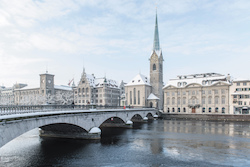Speaker
Dr
KITAE KIM
(Korea Polar Research institute(KOPRI))
Description
Ice is one of the simplest crystalline materials on earth and plays various important roles on earth environmental system. Although enormous progress has been made in understanding on physics and chemistry of ice, we have still a large number of mysterious features on ice. In most cases, chemical reactions take place slowly when temperature drops according to Arrhenius Equation. However, several processes are very accelerated by freezing compared to aqueous solution. Furthermore, the reaction mechanism during chemical transformation in ice is different from that in aqueous water. For example, Takenaka et. al., found that the NO2- oxidation in the presence of oxygen to NO3- was 100,000 times enhanced by freezing. The unexpected accelerated chemical reactions in ice have significant impacts on earth environment. In spite of the ice’s important roles on various Earth’s system, the investigation on chemical reaction in ice is insignificant. The redox transformation and speciation affect bioavailability, mobility, environmental fate, and toxicity of metals or inorganic elements. In this talk, I want to introduce our experimental results about accelerated redox reaction in ice such as enhanced dissolution of metal oxide particles, fast detoxification of harmful heavy metals and organic pollutants, and the enhanced chemical transformation of halogen species.
Significance statement
In spite of the ice’s important roles on various Earth’s system, the investigation on chemical reaction in ice is insignificant. Several reactions are very accelerated by freezignand have siginicant environmental implications.
Author
Dr
KITAE KIM
(Korea Polar Research institute(KOPRI))
